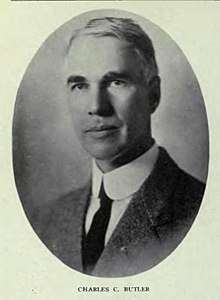Charles C. Butler
Charles C. Butler (February 6, 1865–November 16, 1946) was an attorney who began practicing law in 1891. Within one year he became a deputy district attorney and then was a district court judge. He served as a justice and the chief justice in the Colorado Supreme Court. Butler served as president of the Teller County and Denver Bar Associations and was vice president of the Colorado Bar Association.
Charles C. Butler | |
|---|---|
 | |
| Justice of the Colorado Supreme Court | |
| In office 1926–1937 | |
| Chief justice of the Colorado Supreme Court | |
| In office 1935–1936 | |
| Personal details | |
| Born | Charles Cicero Butler February 6, 1865 Milwaukee, Wisconsin |
| Died | November 16, 1946 Denver, Colorado |
| Nationality | American |
| Political party | Republican |
| Spouse(s) | Emma Allen |
| Alma mater | University of Michigan |
| Occupation | Justice and chief justice |
Early life and education
Charles Cicero Butler[1] was born on February 6, 1865 to Washington Irving and Henrietta Comstock Butler in Milwaukee, Wisconsin.[2][lower-alpha 1] His father, born in New York, was a lawyer who lived in New York and Wisconsin.[4][5] In 1868, he moved to New York City and practiced law until his death in 1885. His mother was born in Ohio. Butler was an only child.[4] He worked in a bank. In 1887, he traveled to Gilpin County, Colorado where he worked as a miner. He then moved to Denver, where he studied law under Robert Collier.[4]
He graduated from the University of Michigan Law School with a Bachelor of Laws (LLB) degree in 1891.[2] He was a member of the Phi Delta Phi fraternity.[6] The same year, he was admitted to the bar in Colorado.[2] He received an honorary Doctor of Law LLD from the University of Denver in 1925.[2][4] He also received a degree from the University of Colorado.[7]
Career
In 1892, Butler was made a deputy district attorney for the Colorado district courts.[2] He moved to Cripple Creek in 1895 and was appointed deputy district attorney in 1904.[2] He was deputy district attorney in Teller and Arapahoe Counties.[7] In 1908, he moved to Denver,[4] and he practiced law there until 1912.[2] He specialized in mining law.[6]
Butler was elected judge of the Denver district court in 1912, 1918, and 1924,[2] serving from 1913 to 1927.[7] Butler, a Republican, served on the Executive Committee and was the Chairman of the Administration of Criminal Justice Committee. While running for District Judge in 1924, he qualified as both a Republican and a Democratic candidate.[2][8]
He was a Justice of the Colorado Supreme Court from 1926 to 1936,[2][7] serving as Chief Justice from 1935 to 1936.[7] He was again a deputy district attorney in 1937 and 1938, and he retired in 1938.[7]
He was a member of the Teller County Bar Association and was the president of the organization for two terms. He was a member of the Denver Bar Association and was the president of the organization in 1925. He was the first vice president of the Colorado Bar Association and served two terms as its president.[2] He was a member of the American Bar Association and the American Judicature Society.[4] He was also a member of the Masonic Temple.[9] He had an office in the Colorado State Capitol Building in Denver.[2]
Personal life
He married Emma Allen on June 5, 1901 in Cripple Creek.[7][4][9][lower-alpha 2] She was the daughter of Rhodes Allen who settled in Sherman County, Kansas. The Butlers had three children Opal Virginia, Leonard B. (born 1901), and Allen G. Butler (born 1908).[10]
He suffered a stroke and died on November 16, 1946 at St. Joseph Hospital in Denver. He was 81 years of age.[7] He was buried at the Fairmount Cemetery in Denver, Colorado.
Notes
- Henrietta and Washington I. Butler were married January 11, 1864. Henrietta Comstock was born September 12, 1838 in Worthington Ohio. She was the daughter of Cicero and Charlotte G. Stiles Comstock. The family moved to Milwaukee, Wisconsin. Her father was the City Comptroller, a State senator and the inventor of "Comstock’s Rotary Spader".[3]
- They were also said to have been married in 1911.[2]
References
- General Catalogue of Officers and Students and Supplements Containing Death Notices. The University of Michigan. 1923. p. 520.
- Who's who in Law. 1937. p. 138.
- Comstock, C. B. (1907). A Comstock Genealogy. p. 130. ISBN 978-5-87535-333-8.
- State Historical and Natural History Society of Colorado (1927). History of Colorado. Linderman Co., Inc. pp. 500–503.
- "Washington I. Butler obituary". Chicago Tribune. May 6, 1885. p. 1. Retrieved February 5, 2020.
- Directory of the International Legal Fraternity of Phi Delta Phi. International Legal Fraternity of Phi Delta Phi. 1897. p. 46.
- "Obituary for Charles C. Butler (Aged 81)". The Daily Sentinel. November 16, 1946. p. 1. Retrieved February 5, 2020.
- Denver Law Journal. University of Denver College of Law. 1923.
- Lewis, George E.; Stackelbeck, D. F. (1917). Bench and bar of Colorado. Bench and Bar Publishing Co. p. 50.
- Blackmar, Frank Wilson. Kansas. p. 335. ISBN 978-5-88093-903-9.
External links
- Charles C. Butler at Find a Grave
- From C. C. Butler's 1138 Downing Ave. [sic Denver], Denver Public Library